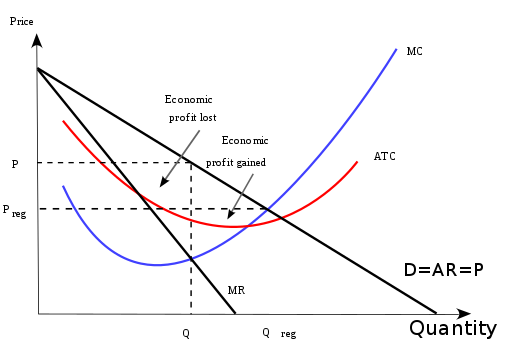The Market Society (Preview)
The Market Society

MonopolyPower-GovRegulated.jpg: MgmwkiPerfect_competition_in_the_short_run.svg: *Perfect_competition_in_the_short_run.png: The original uploader was Sheitan at English Wikipedia.Costcurve_-Combined.svg: *Costcurve-_Combined.png: The original uploader was Sheitan at English Wikipedia.derivative work: Jarry1250 [CC BY-SA 3.0 (https://creativecommons.org/licenses/by-sa/3.0)], via Wikimedia Commons
In many of my posts I present some converging themes around topics such as markets, incentives, reinforcement of behaviors, morality, social exchange theory, data and sentiment analysis, predictive analytics, data mining, and more. In these posts I'm mostly sharing some of the basic concepts behind my current worldviews and opinions. In some of my older posts I discussed a bit of the technical ideas and shared the philosophy of transhumanism. The transhumanist ideas include the concept of an exocortex. The concept of the exocortex is not my idea but the decentralized exocortex was put forth by me and seems to be the first "blockchain exocortex" concept expressed in a blog.
The reasoning behind wanting an exocortex is the belief (yes I'm using the word belief) that society is becoming increasingly complex at a faster rate than the human brain will be able to handle. The signs are already becoming apparent in my opinion because we can look at the concept of "extended mind" in which an an individual stores their memories in their smart phone. Snapchat even has a feature called memories where people can store their video snaps and pictures of their life experiences. The concept of Google Glass was to take this to the next level of allowing "life streaming". In a truly transparent high tech society we might find that private moments cease to exist as it will be technically possible to lifestream or record nearly every moment from birth until death.
The technical restrictions are whether there will be enough storage capacity but the storage capacity is growing at such a rate that I predict we will reach in the next 10 years a point where people will be able to do entire life streaming if the market chooses to go down that path. The ability of all people to never have to forget anything ever again would change society as we know it. Smart phones already reduce the ability to forget to some degree and I expect sensors to become more ubiquitous, better and this includes drones.
Agents are another concept I discuss a lot and also the concept of swarms. I discussed the concept of swarm computers where human computation is turned into a commodity just as machine computation is and both of these commodities are traded within a social computational network I called a swarm computer. This is the sort of network which will allow for decentralized search engines or knowledge search but these technologies will deeply change human interaction as well. If anyone can search for anything in an automated way, for an undetermined amount of time, using market forces, well now we have something the world has never seen before.
Google only allows people to search for information supplied to Google. A decentralized search would be able to search for information from anywhere it is accessible. If we assume all information has some cost attached to it then it means any information could be traded. This is good and bad and I will not go into that in this post but will instead focus on the topic which is that we are either already in or we are going to see emerge what I call a market society.
What is the Market Society?
To understand a market society we have to understand that all interactions have rewards and costs. This could also be called "risks and benefits". This ratio between rewards and costs are what determines the worth of an interaction. In other words the costs vs benefits determine if an interaction is "worthy". This is not all that different from thinking of all interactions as having a "credit" and "debit" attached to them where an agent is either winning points (credits) or losing points (debits). In a market society the technology will allow for enough data and understanding that these costs and benefits will become more apparent to participants.
For example Alice (agent A) could ask her new digital assistant to reveal to her the worth of a particular connection to a particular person Bob (agent B). This digital assistant could tell Alice that her being connected to Bob is at too high of a cost to her interests and is no longer worth it. This is an example of how the technology of an "exocortex" provided by a mere digital assistance could change dramatically the social behavior of a certain class in society. The class in society which chooses to embrace the pursuit of rational self interest and embrace the market society will eventually have behaviors which might not even make much sense to people who stick to the traditional modes of interacting.
The psychological divide is already starting to happen
Sam Vaknin in specific highlighted that social media is changing the brains of digital natives. That digital natives eventually will think and live in ways which do not resemble at all how digital immigrants or more traditional demographics will live. We already are beginning to see for example that social media rewards narcissistic thinking. If you use Instagram you do get social rewards if you interact with the platform in a particular way. In other words to win the game means to adopt market psychology which is typically profit seeking. In this case profit is measured in the social rewards. On Instagram this would be the amount of followers you have, who your followers are, the amount of engagement you can get from your followers, and popular sentiment you earn from those followers, all trackable metrics.
Followers are a form of stigmergy and in the context of a swarm it is a coordinating mechanism. The concept of a swarm computer applies here and we can see swarm behaviors on Twitter and Instagram already using hashtags and follower lists. These behaviors create a layer of sophistication over society which never existed prior. A photograph on Instagram/Twitter with the wrong person can cost (produce social punishments) which can ruin a person while a photograph with the right person can allow a person to gain what is called "clout". As a result we now see from digital natives a behavior called "clout chasing".
What we have to understand is that the UX is at it's core based around economics. These are markets in the form of the market for the scarce human attention. For example, Sarah posts Instagram pictures which she knows will attract attention just as a flower uses it's bloom to attract the attention of bees. This attention translates into followers and these followers provide rewards. One form of these rewards are the social rewards such as the likes or the compliments but the other kind of rewards are the fact that the more socially desirable Sarah becomes, the easier it becomes for her to translate her currency of likes into monetary rewards.
Reward mechanisms

Kristiaan from Haarlem, The Netherlands [CC BY 2.0 (https://creativecommons.org/licenses/by/2.0)], via Wikimedia Commons

Catlovers [CC BY-SA 2.0 (https://creativecommons.org/licenses/by-sa/2.0)], via Wikimedia Commons
In a Market Society the behaviors emerge based on the incentives in the environment. Reward mechanisms are behind what is called incentive salience. A reward is a stimulus which provides some cognitive fulfillment of a "want" or "need". As an example, any animal must drink water so water is a universal need. Water becomes a reward to a thirsty animal in an environment. The better the water (the more refreshing and better it tastes) the better it is as a reward for those who are thirsty. If water is extremely scarce then water becomes extremely rewarding when it's found.
In society attention is something almost everyone wants. Attention is also a scarce resource because there is only so much to go around. As a result the members of society (non-human animals included) all compete for attention. A family cat for example might have to compete for attention with the infant. If it's a brother and a sister then both might have to compete for the attention of their parents. This competition for attention is at the core of a lot of behaviors we see. To be specific, a lot of status competitions, social rankings, and achievements, are just the ways that human beings compete for the attention of other human beings.
The concept of biological markets takes it further to explain that not only do human beings rely on markets but non-humans are doing it too. The BAT token for example is based on the fact that "eyeballs" aren't free and the "mental real estate" isn't free. I prefer to use the term "mental real estate" to represent the concept of "acquiring eyeballs" because it's not the eyes they want. The attention market is at the core of all other markets in a market society and this competition for attention in my opinion is behind the majority of behaviors.
- Positive forms of attention include praise, likes/love, affection, recognition, prestige, and more. These are the foundation behind the social rewards for behaviors which the market society decides should be rewarded.
- In a market society there will usually be societal standards. Specifically these are called the "community standards" and these dictate which behaviors are frowned upon. The pressure the community uses to enforce conformity to these "community standards" comes from the fact that there is transparency and accountability for all behaviors.
- First let's assume a hypothetical scenario where secret or private behaviors are impossible. All behaviors in the market are observable by all other participants in the market. Now let's assume the community standards are a social consensus stored in the minds of the participants and used to rank the value of different behaviors. Good behaviors (highly valued behaviors) would be the behaviors which meet or exceed the expectations in the minds of the participants in the community whilst also not violating community standards. Bad behaviors (behaviors of low value or no value) are the behaviors which violate the community standards. In an environment where all behavior is public behavior then we could expect that lists will form which rank and attach scores to all behaviors. If anything in society is keeping score (whether it's done in secret or in public like in China) then these scores will be available for those who want to create accountability and enforce conformity with public opinion.
The interesting thing to note is that in most cases the behaviors which are good or bad will not actually be knowable in advance. This is because the goodness or badness is often subjective to the extent that just as we cannot predict how a piece of art will be rated by the market we can also have a difficult time predicting how a certain behavior will be rated by the market. The concept of "market for behaviors" is in essence to describe a society where any and all possible behaviors are scored.
If the reward scores for certain behaviors are made public then this would be the reward for anyone who adopts that behavior. Example if the market provides data indicators showing that demand exists for a certain photograph to be taken of a certain location at a certain time then if the reward is made explicit it then sends a signal to the market paying for that behavior to emerge. According to behaviorism this is called a positive reinforcement. The reward could be simply increased attention of a sort which the photographer seeks (notoriety).
UNFORTUNATELY THIS ARTICLE IS JUST A PREVIEW. IF YOU LIKE THIS ARTICLE AND WOULD LIKE TO SEE THE FULL VERSION THEN SUPPORT MY BLOG. STEEM DOES NOT PROVIDE FAIR REWARDS AND AS A RESULT I HAVE HAD TO SCALE DOWN MY CONTENT. PATREON AND OTHER OPTIONS MAY APPEAR IN THE FUTURE AND THE FULL VERSION OF THIS ARTICLE AND MANY OTHERS CAN THEN BE RELEASED IF I RECEIVE ENOUGH SUPPORT.
IF YOU LIKE THIS CONTENT, EXCLUSIVE FOR SUPPORTERS ONLY:
https://www.minds.com/danaedwards/blog/the-market-society-ii-929528661744799744
To listen to the audio version of this article click on the play image.

Brought to you by @tts. If you find it useful please consider upvoting this reply.
Careful with Patreon they are having their own issues... too bad Steemit does not have a premium content application here. One blog (truncated for public say 50 to 100 words), and premium content full version of the blog... and with added video possibility instead of BitTube, YouTube or DTube.
That could work in combination with some kind of micropayment infrastructure.
One platform, one task with multiple layer benefit.